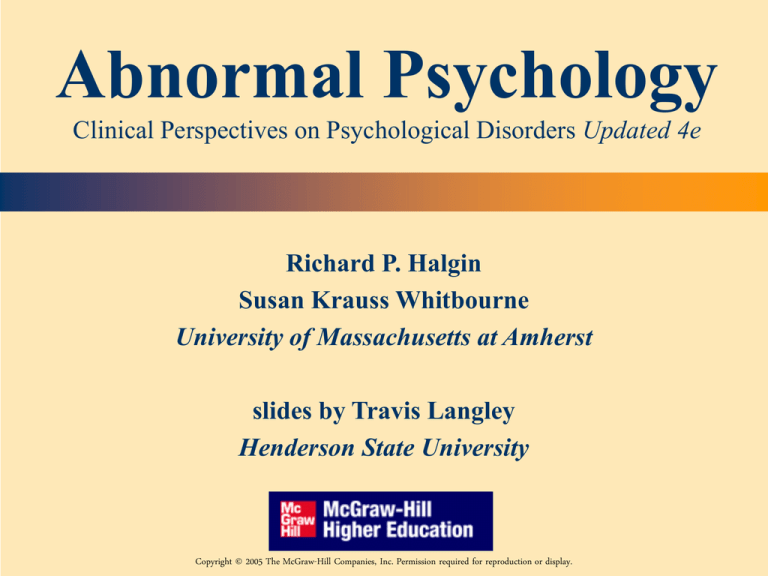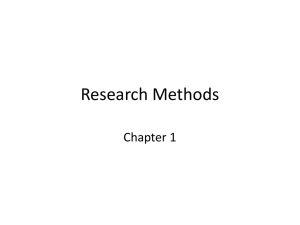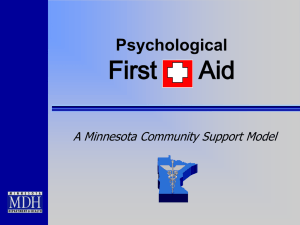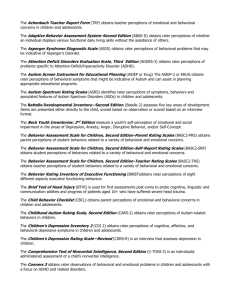Abnormal Psychology Clinical Perspectives on Psychological
advertisement

Abnormal Psychology Clinical Perspectives on Psychological Disorders Updated 4e Richard P. Halgin Susan Krauss Whitbourne University of Massachusetts at Amherst slides by Travis Langley Henderson State University Copyright © 2005 The McGraw-Hill Companies, Inc. Permission required for reproduction or display. Chapter 3: Chapter 3: Assessment Assessment What Is Psychological Assessment? Assessment: A procedure in which a clinician evaluates a person in terms of the psychological, physical, and social factors that influence the individual's functioning. Interview History Taking Personal History Family History Interview History Taking Personal History Family History Kinds of Interviews Unstructured Interview Structured Interview Mental Status Examination To assess: Appearance and Behavior Orientation Content of Thought Thinking Style and Language Affect and Mood Perceptual Experiences Sense of Self Motivation Cognitive Functioning Insight and Judgment Mental Status Appearance and Behavior Examples of Abnormal Motor Behavior: Hyperactivity Psychomotor Agitation Psychomotor Retardation Catatonia Compulsion Mental Status Content of Thought Content of Thought: Ideas that fill a person’s head. Examples of Abnormalities: Obsessions Delusions Overvalued Ideas Magical Thinking Mental Status Affect and Mood Affect: An individual’s outward expression of emotion. Inappropriate Blunted or Flat Exaggerated, Heightened, or Overdramatic Decreased Mobility Excessive Mobility Restricted Range Mental Status Affect and Mood Mood: An individual’s personal experience of emotion. Euthymic = Neither happy nor sad. Dysphoric = Unpleasant feelings. Euphoric = Cheerful, elated, possibly even ecstatic. Mental Status Perceptual Experiences Hallucination: False perceptions not corresponding to the objective stimuli present in the environment. Auditory Command Visual Olfactory Somatic Gustatory Mental Status More Aspects of Mental Status Orientation: A person’s awareness of time, place, and identity. Thinking Style and Language: Vocabulary and sentence use indicate how a person thinks. Motivation: Motivational impairment can make even ordinary life tasks seem insurmountable. Mental Status More Aspects of Mental Status Sense of Self: The individual’s personal identity or sense of “who I am.” Cognitive Functioning: Level of intelligence evidence by details such as memory and abstract ability. Insight and Judgment: Understanding and decision making. Psychological Testing What Makes a Good Psychological Test? Validity Reliability Standardization Intelligence Testing Intelligence Quotient: A method of quantifying performance on an intelligence test. Originally: I.Q. = Mental Age Chronological Age Intelligence Testing First intelligence test by Binet. Revised as the Stanford-Binet. Wechsler scales now more widely used. Wechsler introduced deviation IQ to replace mental/chronological age ratio. I.Q. = Mental Age Chronological Age X 100 Intelligence Testing Deviation IQ: An index of intelligence derived from comparing the individual's score on an intelligence test with the mean score for that individual's reference group. I.Q. Developed by Wechsler. Eventually adopted as widespread standard. Incorporated into the Stanford-Binet. The distribution of IQ scores across the population fits a normal curve. Personality and Diagnostic Testing Self-Report Clinical Inventories contain standardized questions with fixed response categories that the testtaker completes, “self-reporting” the extent to which the responses characterize him or her. MMPI and MMPI-2 NEO Personality Inventory MCMI-III Personality and Diagnostic Testing Projective Tests Rorschach TAT Behavioral Assessment Behavioral Assessment: A form of measurement based on objective recording of the individual's behavior. Behavioral Assessment Behavioral Self-Reports Behavioral Interviewing Self-Monitoring – Target Behavior Behavioral Checklists and Inventories Behavioral Assessment Behavioral Observation In Vivo Observation Limitations include reactivity. Reactivity: Change in a person's behavior in response to knowledge that he or she is being observed. Behavioral Assessment Behavioral Observation In Vivo Observation Analog Observation Environmental Assessment Environmental Assessment: A form of measurement examining the environment in which in the individual lives. Physiological Assessment Psychophysiological and physiological techniques assess bodily functioning and structure. Physiological Assessment Psychophysiological Techniques ECG, BP, EMG Physiological Techniques Brain Imaging: EEG, CT, MRI, PET Neuropsychological Assessment Neuropsychological assessment: A process of gathering information about a client's brain functioning on the basis of performance on psychological tests. Putting It All Together Internet Resource For more information on material covered in this chapter, visit our website: http://www.mhhe.com/halgin4u







